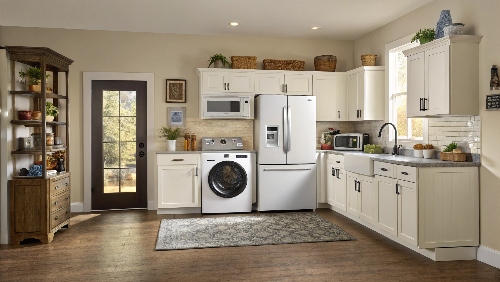Most household appliances have an average lifespan of 8 to 15 years, depending on the type and the level of maintenance. Refrigerators typically last around 13 years, while dishwashers and microwaves may need to be replaced after 9-10 years. A 2023 Euroconsumers survey revealed an increase in the lifespans of large appliances across Belgium, Italy, Portugal, and Spain, rising from 11 years and 7 months in 2019 to 12 years and 6 months. Understanding the lifespan of each appliance can help you make informed decisions about when to repair or replace it. Regular maintenance, such as cleaning filters and checking seals, can extend the life of your appliances and delay the need for costly replacements.
Lifespans of Home Appliances
Appliances don’t last forever, and some wear out faster than others. If you are aware of the average lifespan of each type, you can plan accordingly and avoid costly surprises. A 2020 report by the German Environment Agency (UBA), conducted in collaboration with the Öko-Institut and the University of Bonn, found that the service life of many electrical appliances, such as washing machines and refrigerators, has shortened in recent years due to increased complexity, the use of electronic components, and evolving consumer habits. Let’s examine the lifespan of everyday home appliances and identify factors that may reduce their longevity.
Kitchen Appliances
- Gas stoves: 15–17 years
- Electric stoves: 13–15 years
- Stove hoods: 14 years
- Microwaves: 9 years
- Dishwashers: 9–10 years
- Refrigerators: 13 years
- Freezers: 11–20 years
Laundry Appliances
- Washing machines: 10 years
- Dryers (gas or electric): 13 years
Factors Influencing Appliance Lifespans
Maintenance
Regular maintenance plays a significant role in determining the lifespan of your appliances. Simple habits, such as cleaning filters, wiping seals, and scheduling occasional checkups, can help prevent major breakdowns. Ignoring minor issues often leads to expensive repairs or early replacement.
Usage Frequency
The more frequently an appliance is used, the quicker its parts wear out. A washing machine used daily by a large family will likely have a shorter lifespan than one used a few times a week. Light use generally extends the product’s service life.
Brand and Model Quality
Not all appliances are built the same. Some brands focus on durability, while others prioritize features or value for money. Choosing a well-reviewed, high-quality model may cost more upfront, but it often pays off through fewer repairs and a longer working life.
Simple Ways to Boost Your Appliances’ Longevity
Appliances don’t always need to fail before you act. Simple habits, such as regular cleaning, avoiding overloading, and inspecting for wear, can help keep your appliances running longer than average.
Taking care of your appliances doesn’t require a technician every time. A few monthly maintenance steps can prevent breakdowns and save you money in the long run.
For a complete guide on what to do and when, check out our full blog on Simple Ways to Boost Your Appliances’ Longevity.
Extend Appliance Lifespan with Beach 2 Bay Appliance Service in Niceville, FL
Want your appliances to last longer and run better? Beach2Bay Appliance Service in Niceville, FL, offers expert advice, repairs, and maintenance services to help you optimize the performance of your home appliances. Call us at 850-830-8306 for friendly, reliable service, or explore more on appliance longevity in our full blog.
Author Profile
- John Raymond Hagler
- Beach2Bay Appliances is a trusted name in Florida for professional appliance repair services. Serving homeowners, realtors, and property managers, our experienced team focuses on reducing costly breakdowns and maximizing appliance efficiency. Committed to reliability, transparency, and customer care, we help maintain the value and functionality of homes and rental properties through routine service and urgent repairs.
Latest entries
 BlogsAugust 30, 2025Oven Smells Like Burning While Cooking? Here’s the Solution
BlogsAugust 30, 2025Oven Smells Like Burning While Cooking? Here’s the Solution BlogsAugust 29, 2025Why Your Dishwasher Isn’t Cleaning Dishes and How to Fix It
BlogsAugust 29, 2025Why Your Dishwasher Isn’t Cleaning Dishes and How to Fix It BlogsAugust 29, 20257 Reasons Your Microwave Isn’t Working and How to Fix It Quick
BlogsAugust 29, 20257 Reasons Your Microwave Isn’t Working and How to Fix It Quick BlogsAugust 27, 2025Why Your Refrigerator Isn’t Cooling and How to Fix It
BlogsAugust 27, 2025Why Your Refrigerator Isn’t Cooling and How to Fix It

